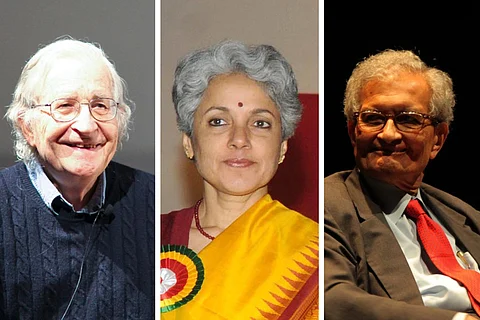

Kerala is being lauded for its efforts in tackling the spread of the novel coronavirus, as it kicked off a conversation on development with a new interview series titled Kerala Dialogue. Launched by Kerala Chief Minister Pinarayi Vijayan on Friday, the first session featured political activist and linguist Noam Chomsky, economist and Nobel Laureate Amartya Sen and Chief Scientist of the World Health Organisation (WHO) Soumya Swaminathan.
The webinar series, organised by the Kerala government seeks to bring together thinkers, policy-makers, professionals, scientists and the public to a space where they could reimagine development for a world disrupted by the pandemic.
Kerala was lauded for the way it handled the pandemic, with Chomsky saying that the way in which Kerala responded was a surprise to the world.
“The differences in the way between Kerala and the rest of India, and the rest of most of the world, on how they reacted to the crisis was quite startling. Not many places have dealt with it the way Kerala has. This pandemic has brought out very sharply the extraordinary inequality that has been, of course always there, but greatly exaggerated through the neoliberal period,” Chomsky said.
When asked if there would be fundamental changes at the end of the pandemic, he said that in countries like the US, those who wield power from US President Donald Trump are trying to continue what is the current situation where they structurally want to be harsher, more authoritarian in nature, with more controls and more surveillance.
They are working right now on things such as deregulation and many other ways. What is going to be a post-pandemic world depends on what people are doing right now,” he told V K Ramachandran, Vice-Chairman of the Kerala State Planning Board.
However, he said, there are movements all over the world that are trying to counter this, and coordinating it can be a huge force. “They can make changes and they are all trying to create a new world," Chomsky said.
In conversation with Ramachandran, economist Amartya Sen praised the state’s public healthcare system, and said that COVID-19 would be a transformative movement in the state and it has dealt with the pandemic by combating bureaucracy and red tape.
Amartya Sen, in his talk, appreciated the public healthcare system and the high level of literacy in the state. “I think COVID would be a transformative movement in Kerala. There is a danger of being deluged under the rather deceptive economic slogan that is so dominant in India today and there is widespread resistance to that. But it also suggests that combating bureaucracy, combating red tape, and doing things with exceeding speed, which indeed is what Kerala seems to have done in dealing with COVID. It is not only important in dealing with COVID-19, but is also important for economic development to get going at a high speed.”
He further slammed the nationwide lockdown that was imposed, which he said was “unplanned and unstructured” and were the actions of someone like Napoleon at war-time. He said it caused distress and hardship.
“It was done on a war footing as if the Prime Minister was Napoleon, rather than the leader of a public movement. It’s very important for any initiative, whether it’s lockdown or not, in connection with COVID-19 or any other pandemic, to have a consultation with the people, with civil society, with different political parties, with the unions, and so on,” Amartya Sen said.
He praised Kerala’s actions of testing, contact tracing and quarantining, and contrasted it with the Centre’s actions.
Professor Amartya Sen also pointed out that the collapse of the public system which has happened in Europe has not happened in Kerala. Though Europe had a tradition of public sector intervention, it is not there now but that kind of reliance on the public sector can still be seen in Kerala.
He added that the pandemic in itself doesn’t come with lessons. “The virus kills indiscriminately. It’s what we do and how we understand the problem that makes a big difference,” he said.
WHO Chief Scientist Soumya Swaminathan, in conversation with The Hindu’s N Ram, said that countries which responded to the WHO’s early warning were able to face the pandemic better.
"On January 30, WHO issued an emergency alert for global COVID-19 defence. But Kerala had already started preventive measures in early January, anticipating potential problems.
That is why the first cases from Wuhan could be discovered, she said, and stressed that following this, Kerala was able to locate and quarantine those who had contact with them and contain the outbreak.
“Kerala has been able to contain the disease as fast as possible due to proper preventive measures,” Swaminathan said.
When asked about the eradication of the virus, she said it was premature to talk about it, because the virus will persist due to the way it has spread and how much transmission has taken place in the last few months.
“So far it is doing like any other coronavirus and hasn’t changed structure in the major domains at which drugs and vaccines are being targeted. It is likely that this virus will stay with us for a long time. Hopefully, we will have a vaccine soon, and hopefully, it will become just another manageable virus,” she said.
When asked about testing, she stressed the need to do so aggressively, and said, “Testing is the only way to know where we are, where the population is and where we need to act. This will be the guiding map for governments across the globe. We can’t fight this virus blindfolded.”